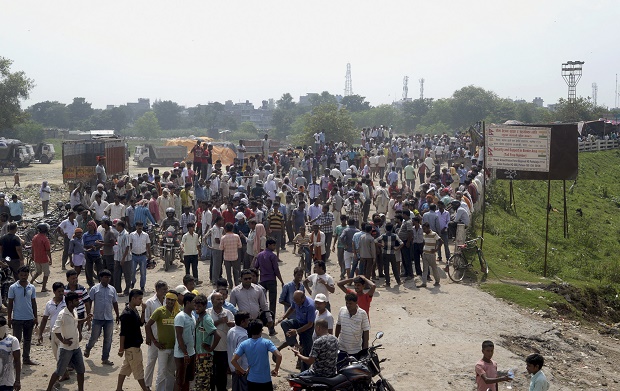Protests in Nepal causing shortages of gasoline, medicine

Nepalese people and Madhesi party leaders block a bridge in Birgunj, a town on the border with India, around 300 kilometers (200 miles) east of Kathmandu, Nepal, Friday, Sept. 25, 2015. Nepal warns that shortages of gasoline and medicine will be severe soon as supplies from India are not arriving during protests at border crossings by hundreds of people angry about Nepal’s new constitution. AP
KATHMANDU, Nepal — Nepal warned on Friday that shortages of gasoline and medicine would be severe soon as supply trucks from India stopped during protests at border crossings by hundreds of people angry about Nepal’s new constitution.
Acting Nepalese Foreign Minister Khagraj Adhikari called Indian Ambassador Ranjit Rae and inquired about obstructions at the border, said Deepak Adhikari, a ministry spokesman.
The Indian foreign ministry in New Delhi denied there was any hurdle on its side and blamed protests inside Nepal for the disrupted movement of oil tankers and trucks loaded with medicine, sugar, salt, food and cooking gas cylinders.
The small Himalayan nation depends heavily on supplies from its giant neighbor.
While many in Nepal cheered the constitution that was adopted Sunday, some ethnic groups object to the territory or boundaries of the seven federal states, or want more government representation, and other protesters want the country to remain a Hindu, rather than secular, nation as was decided. The protests have been subsiding, but violence related to the protests has killed at least 45 people in recent weeks.
On Friday, hundreds of protesters blocked a bridge linking Birgunj, a Nepalese border town, with India. The area is nearly 300 kilometers (200 miles) east of Kathmandu, the capital.
“The protests have gone down significantly. There are some minor protests on the border. But Indian officials don’t allow the cargo trucks from crossing the border citing security reasons,” said Laxmi Prasad Dhakal, a Home Ministry spokesperson. “Hundreds of trucks have not been allowed to enter Nepal.”
Deepak Baral, the Nepal Oil Corporation spokesman, said only 40 oil tankers entered Nepal from the Indian side on Thursday. “Today, the supply has come to a complete halt.”
“Nepal will face severe shortages of petroleum products in a few days if the situation continues,” Baral said.
There will be a shortage of medicines in a week or so if the issue was not resolved, said Mrigendra Mehar Shrestha, chairman of the Association of Nepal Chemists and Druggists Association.
“There is already a shortage of saline solutions and other essential medicines related to diseases such as blood pressure and diabetes. The shortages will immediately hit the districts outside Kathmandu,” he warned.
The Indian embassy in Nepal said in a statement that Indian traders and transporters have had difficulties moving within Nepal and are worried for their safety. They fear their trucks will be looted by protesters if they ply unescorted by security guards.
India says that the aspirations of the disgruntled groups from the southern plains bordering India have not been met, and that the troubles might flare up violence spilling into India, where a large number of Nepalese nationals work.